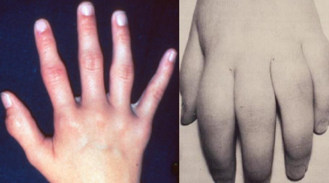Juvenile arthritis should be suspected in a child who exhibits
frequent fractures.
joint swelling and pain lasting longer than 6 weeks.
lurching and abnormal gait with limited abduction.
increased joint mobility.
The Correct Answer is B
Juvenile arthritis should be suspected in a child who exhibits joint swelling and pain lasting
longer than 6 weeks. Juvenile arthritis refers to a group of chronic inflammatory conditions
that affect the joints in children and adolescents. Persistent joint swelling and pain are
common symptoms of juvenile arthritis and are often accompanied by other signs such as
morning stiffness, limited range of motion, and joint warmth.
, frequent fractures in (option A) is not correct because it, is not typically associated with
juvenile arthritis. Fractures are more commonly associated with conditions affecting bone
strength, such as osteoporosis or certain genetic disorders.
lurching and abnormal gait with limited abduction in (option A) is not correct because it,
may be seen in certain musculoskeletal conditions or hip joint abnormalities, but it is not
specific to juvenile arthritis.
increased joint mobility in (option D) is incorrect because it, is not typically associated with
juvenile arthritis. In fact, joint stiffness and limited range of motion are more characteristic of
this condition.
Nursing Test Bank
Naxlex Comprehensive Predictor Exams
Related Questions
Correct Answer is C
Explanation
In the given scenario, the 6-year-old patient in skeletal traction is experiencing
pain, edema, and fever. These symptoms raise concerns about the possibility of an infection
at the site of traction. In such cases, the nurse should assess for warmth at the site of pain.
Increased warmth can indicate inflammation, which may be associated with infection. This
assessment finding would require further investigation and intervention, such as notifying the
healthcare provider and obtaining appropriate cultures or imaging studies.
Neurologic status in (Option A) is incorrect because assessing neurologic status, is important
but not the priority in this scenario. Neurologic status assessment is typically performed to
evaluate any neurovascular compromise resulting from the traction, but the presence of pain,
edema, and fever suggests a potential infection that requires immediate attention.
Range of motion of all extremities in (Option B) is incorrect because assessing the range of
motion of all extremities, is not directly relevant to the given symptoms and should not take
priority over assessing for warmth at the site of pain.
Blood pressure in (Option D) is incorrect because assessing blood pressure, is not directly
related to the symptoms of pain, edema, and fever in the context of skeletal traction. While
blood pressure is an essential vital sign, it does not provide specific information about the
potential infection at the site of pain in this situation.
Correct Answer is A
Explanation
A change in status that should alert the nurse to increased intracranial pressure (ICP) in a child with a head injury is confusion and altered mental status. As intracranial pressure increases, it can affect brain function and lead to neurological changes, including confusion, disorientation, irritability, decreased level of consciousness, or other alterations in mental status. These changes indicate that the brain is being compressed and compromised, and immediate intervention is required.
Option B, increased diastolic pressure with narrowing pulse pressure in (option B) is incorrect because it, can be a sign of increased ICP, but it is not specific to head injuries and can be influenced by other factors such as pain, anxiety, or systemic conditions. It is important to consider the overall hemodynamic status of the child and assess for additional signs and symptoms of increased ICP.
irregular, rapid heart rate in (option C), can be a sign of increased ICP, but it is not specific to head injuries and can be influenced by other factors such as pain, anxiety, or other medical conditions. Assessment of heart rate should be considered along with other signs and symptoms of increased ICP.
rapid, shallow breathing, in (option D) can be a sign of increased ICP, but it is not specific to head injuries and can be influenced by other factors such as pain, anxiety, or respiratory conditions. Respiratory assessment should be considered along with other signs and symptoms of increased ICP.
Whether you are a student looking to ace your exams or a practicing nurse seeking to enhance your expertise , our nursing education contents will empower you with the confidence and competence to make a difference in the lives of patients and become a respected leader in the healthcare field.
Visit Naxlex, invest in your future and unlock endless possibilities with our unparalleled nursing education contents today
Report Wrong Answer on the Current Question
Do you disagree with the answer? If yes, what is your expected answer? Explain.
Kindly be descriptive with the issue you are facing.

